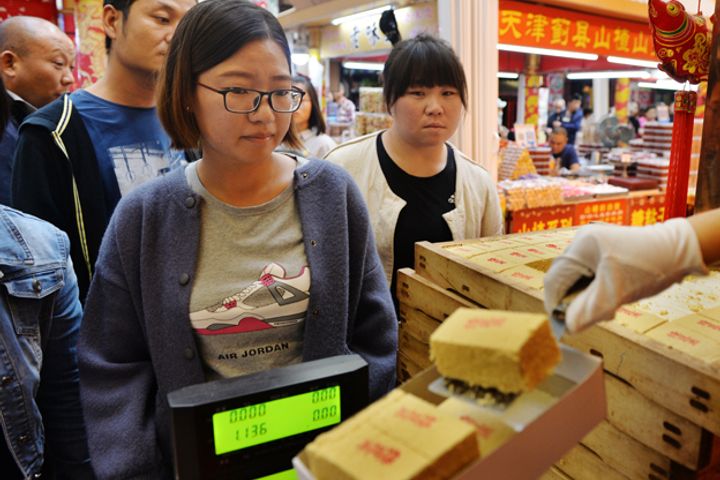 New Retail Stores Become Tourist Sites During Chinese Golden Week; Alibaba's Hema Reports Strong Sales
New Retail Stores Become Tourist Sites During Chinese Golden Week; Alibaba's Hema Reports Strong Sales(Yicai Global) Oct. 9 -- Chinese retailers and catering businesses reported total sales revenues of CNY1.5 trillion (USD227.27 billion) during the country's eight-day National Day holiday, which ran from Oct. 1 to 8 and is also known as Golden Week, up 10 percent in average daily sales compared with the same period last year, Beijing Business Today reported on Oct. 9.
China's new retail sector, a combination of offline and online experiences, increased in popularity among consumers with some shopping hubs becoming tourist attractions themselves.
Supply chain innovations and online-to-offline fusion have been the new driving forces behind consumer spending growth, the Chinese Ministry of Commerce said.
New retail grocery stores, including Alibaba Group Holding Ltd.'s [NYSE:BABA] emerging online-to-offline supermarket Hema Xiansheng Supermarket, and cashier-free convenience stores that use Chinese start-up Bingobox's WeChat-based payment system, were extremely popular among tourist shoppers during the holiday.
Some travel agencies even listed the innovative stores as tourist attractions.
Hema Supermarket organized one-day tours in partnership with a local Shanghai travel agency to attract visiting tourists during the long holiday.
The marketing campaign was very successful, said e-commerce business expert Peng Chengjing, as it allowed consumers to get a real taste of the new retail models through the application of cyber-marketing in brick-and-mortar stores. New retail is a great idea, but it will not replace traditional retail completely because in-store customer experience is important too, he added.
However, multiple unmanned convenience stores and supermarkets suffered serious sales slumps over the holiday, with some even closing for the week, in stark contrast to Hema Supermarket's impressive sales figures.
Consumer demand is mostly limited to tourist products and services during the National Day holiday, said Lai Yang, executive vice president of the Beijing Institute of Business Economics. Apart from tourism, people are interested in experiencing new services, such as restaurants and entertainment outlets, when they are on holiday. New retail businesses offer a totally new customer experience, which appeals to these consumers.
As unmanned stores are positioned as a supplement to traditional convenience stores, they only sell a limited range of products, and consumers only frequent them when they do not have the time to visit supermarkets, he added. It is therefore not surprising that unmanned stores did not perform very well during the holiday season. If a cashier-free grocery store experiences a spike in the number of visitors over a short period of time, it may lead to serious logistics, stocking and cost control issues, adversely affecting its sales efficiency.